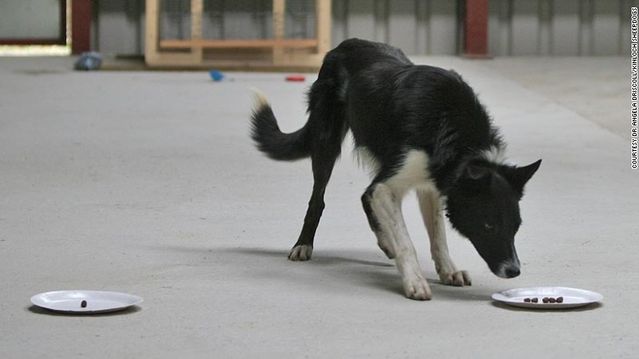Intelligence
Understanding the Nature of Dog Intelligence
It appears that dogs are generally smart or generally dumb at everything.
Posted February 16, 2016

As I was reading a recent report describing research on the testing of dog intelligence I was reminded of an experience that I had some 15 or 20 years ago. I was visiting a respected breeder of German Shepherd Dogs. He bred and trained service dogs, so these particular German Shepherd Dogs did not look much like some of the specimens that one sees in the show ring today, with their strongly sloping backs and weak hindquarters. Rather these were athletic dogs that looked like Rin Tin Tin of movie fame.
It was important for him to sort out which dogs were most likely to succeed as service dogs, since there is a huge investment of time involved in training them. This meant that he had to assess the intelligence of his dogs at an early age. He was just about to test a litter and invited me along to observe. The pups were just about eight weeks in age, and there were eight puppies in the litter. He took the pups one at a time out into the yard and then showed them a soft ball-shaped toy, waving it around to get the dog's interest. He then tossed the toy and observed whether or not the dog retrieved it and at least brought it part of the way. He repeated this game two more times.
As he worked with one dog he explained to me, "Clarence Pfaffenberger, the man who was really responsible for the development of the first truly successful guide dogs for the blind program, tested his dog's mental abilities extensively. However, he claimed that the best single indicator of whether a dog would successfully complete the training was whether or not the dog would retrieve. In my testing I've modified his notion somewhat. A dog that shows no interest in retrieving I simply write off as unlikely to have the mental abilities needed for a service dog. However I also added an intellectual component to the test."
At that point he again tossed the toy, only this time he tossed it over a barrier which was really just a screen door that had been laid on its side and propped up so that the dog could see the toy land on the ground behind it. The puppy looked confused and nosed at the barrier. Next it scanned the area as if it were considering the situation and then gradually started to move along the barrier. Eventually the puppy made its way around the screen and grabbed the toy. The second time that the breeder tossed the toy over the barrier the dog raced up to it and without hesitation detoured around and grabbed it. He turned to me and said "That's what I want to see. A dog that solves this simple problem quickly and learns what works, is a smart dog. Generally speaking, I really don't need much more testing than this. This is an intelligent dog that will solve other problems just as quickly and easily although a lot of other trainers will insist on more tests."
The underlying notion behind the idea that any one kind of mental test can predict the overall intelligence of an individual has a long history when dealing with human intelligence. The British psychologist Charles Spearman (1863-1945) did wide-ranging testing of people and based on his later statistical analyses of the results he concluded that there is a general intelligence factor which he called G. Thus if a person is good at one set of cognitive tests it is highly likely that that person will be good at a whole variety of other different tests. Put simply his theory says that if you are good at one thing involving mental skills, then it is highly likely that you'll be good at most things involving cognitive abilities. A large number of psychologists believe that this theory is by and large sound, and apparently some people like Pfaffenberger and this breeder also believe that this concept of general intelligence works just as well for dogs. However, although there are indications that a dog's mind works in a manner which is quite similar to that of a young human child (click here for more on that) up to now there has been no data which directly addressed the concept of general intelligence in canines.
The research report which brought this memory back to me appeared in the journal Intelligence*. The researchers involved were Rosalind Arden, from the London School of Economics, and Mark Adams, a Research Fellow at the University of Edinburgh. They tested the individual differences in various aspects of intelligence in 68 Border Collies. It seems that nowadays, based on the research that suggests the Border Collies may well be the brightest dogs around, dogs of this breed are chosen very frequently as the subjects of tests involving mental abilities and intellect (click here to see the relative intelligence of various dog breeds).
Arden and James used three types of cognitive tests. The first involved a detour test, similar to that used by the breeder that I described above. There were actually four variants of the test, ranging from a very simple one up to a very complex test in which the dog had to find its way around a barrier in order to get a treat. The next type of test involved the dog's ability to interpret communication cues, namely to understand the meaning of a human pointing at particular containers. The third type of test involved the ability of the dog to assess quantity, and to reliably pick out a plate which contained a larger quantity of food than another plate.

The results were rather straightforward. To begin with the investigators found that not all Border Collies were equally intelligent. While this is a very bright breed, some are exceedingly intelligent, while apparently some others are not all that exceptional. However their most important finding dealt with how well the dog's score on the detour problems predicted its scores on the other tests. Remember these other two tests involved very different mental abilities. When they did the statistical analysis the researchers found that dogs which were good on the detour problems were also good on the other two classes of problems, while dogs who were not so good on the detour problems did considerably less well on the other types of tests. This provides strong evidence for the idea of a general factor in intelligence with smart dogs being generally proficient at everything and not so smart dogs doing generally more poorly on most other measures.
Co-researcher Mark Adams summarizes the results of this study this way, "Dog intelligence is structured similarly to ours in having an overlap among different abilities, just as we do. For example, in people, scores from verbal skills and nonverbal skills tests tend to overlap. We found strong suggestive evidence of this in dogs, except of course we did not measure their verbal skills!"
Stanley Coren is the author of many books including: The Wisdom of Dogs; Do Dogs Dream? Born to Bark; The Modern Dog; Why Do Dogs Have Wet Noses? The Pawprints of History; How Dogs Think; How To Speak Dog; Why We Love the Dogs We Do; What Do Dogs Know? The Intelligence of Dogs; Why Does My Dog Act That Way? Understanding Dogs for Dummies; Sleep Thieves; The Left-hander Syndrome
Copyright SC Psychological Enterprises Ltd. May not be reprinted or reposted without permission
Data from:
* Rosalind Arden and Mark James Adams (2016). A general intelligence factor in dogs. Intelligence, 55, 79-85.




